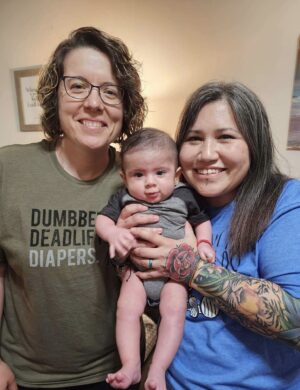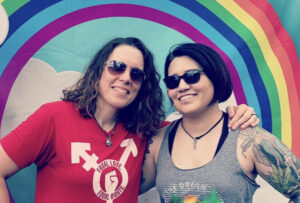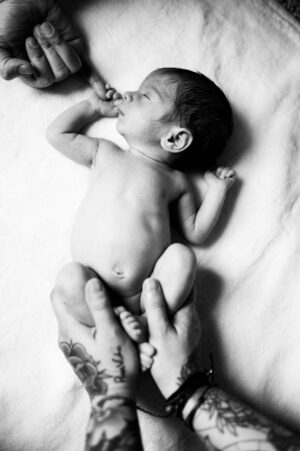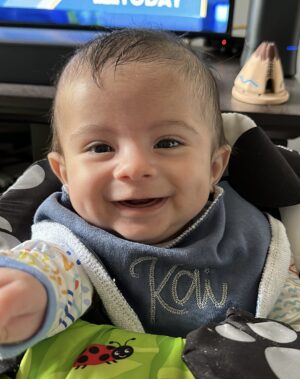Three vials of sperm, two IUI’s and one IVF cycle, and their journey was only just beginning

“There are many options for how to conceive a baby, and people need to explore all the options,” says Jessica Chan, who offers her advice to other couples struggling to have a family. “We had an online profile and we had just completely forgotten about it. And then people saw it, and now we have a baby.”
Jessica and her wife, Jennifer, sought fertility treatment in 2019 after deciding they were ready for a family. After speaking with her doctor, Jessica’s OB-GYN recommended intrauterine insemination (IUI).
With three vials of donor sperm, the couple decided to give IUI a shot. Two procedures left unfavorable results for Jessica, who was going to carry the pregnancy, and just one more vial of sperm remained. Believing this was their last chance, Jessica and Jennifer considered their options and decided to try in vitro fertilization (IVF).
As they researched fertility clinics, they learned about a clinic in Colorado. Using their final dose of sperm and Jessica’s retrieved eggs, they moved forward with IVF. They were heartbroken to learn the cycle had failed. But fortunately, fate had another course for the couple.
Exploring embryo donors to build an LGBT family
Jessica had always wanted to have a baby. “When I realized I was gay, I was scared that I wouldn’t be a mom. Then I found out that I could still be a mom one day if I met the right person,” says Jessica about finding a partner open to LGBT third-party reproduction.
Luckily for both Jessica and Jennifer, they found each other. However, their journey to have a child was an uphill battle, and the climb was becoming a painful one. After several unsuccessful attempts at trying to conceive using donated sperm and one attempt with IVF, the couple said it wasn’t meant to be. They were devastated. They tried to move on with life.
But a few years later, they both knew that despite having a great relationship and being content with their lives, they wanted more. They wanted a family.
Connecting with the community of embryo donors on Facebook
While Jessica and Jennifer were placed on the waitlist with an embryo donor organization in Nashville, they stumbled across a Facebook group where people meet, exchange stories and donate embryos. They created a profile on the group page and posted to the message board. Around the same time, a friend told them about Tennessee Reproductive Medicine (TRM).
A blooming relationship for two diverse families

Shortly after Jessica and Jennifer shared their story on Facebook, a woman and her wife contacted them saying she felt like they were a perfect match.
The donor couple was pregnant with their first child at the time and had extra embryos. They weren’t sure if they wanted to donate right away due to their desire for another baby down the road. Then they read Jessica and Jennifer’s story. The donor couple was incredibly moved, telling Jessica that they wanted to give them one of their embryos.
As Jessica and her wife worked through the donor embryo process with the other couple, the relationship between the families grew. Talking every day, they became more than acquaintances – they became friends.
A miracle made possible by TRM doctors & the selfless sacrifice of embryo donors
 The donated embryo had shipped from California to TRM, and Jessica and Jennifer worked with one of TRM’s physicians, Dr. Jessica Scotchie, who is board certified in reproductive endocrinology & infertility. Even though they lived in Spring Hill, TN, they were able to access care conveniently by doing monitoring in their hometown and by having TRM and Dr. Scotchie managing the cycle.
The donated embryo had shipped from California to TRM, and Jessica and Jennifer worked with one of TRM’s physicians, Dr. Jessica Scotchie, who is board certified in reproductive endocrinology & infertility. Even though they lived in Spring Hill, TN, they were able to access care conveniently by doing monitoring in their hometown and by having TRM and Dr. Scotchie managing the cycle.
Dr. Scotchie made herself available virtually for Jessica and Jennifer, answering any questions they had about the process. “She was wonderful. I just really felt like she cared about us, connected with us,” says Jessica. “She was very personable and easy to get in touch with.”
Compared to the other fertility clinic they tried, Jessica noticed a difference in TRM’s treatment and communication, stating that the other clinic was too busy to even follow up. “I had to stay on top of them all the time, and with Dr. Scotchie it was just so much easier.”
Jessica was adamant about trying an endometrial scratch after researching and hearing about it online. Some think that scratching the uterine lining (endometrium) before transferring an embryo in IVF increases the chances of successful implantation for a pregnancy. Dr. Rink Murray, another reproductive endocrinologist (REI) and co-founder of TRM, divulged to Jessica the inconclusive results from studies and the likelihood of success.
Jessica didn’t care. She wanted to try everything.
The stakes were high for Jessica and Jennifer. After heartache from unsuccessful procedures, Jessica was nervous it wouldn’t work out. She knew it was their last opportunity. She couldn’t afford to do IVF again, and her emotions couldn’t take another failed attempt.
Not long after Dr. Murray performed the embryo transfer procedure and Jessica completed IVF, she and her wife took a pregnancy test.
It came back positive.
Trying other options made the impossible, possible
Jessica and Jennifer were on FaceTime with Jessica’s sister and brother-in-law when they showed them the plus sign on the pregnancy test. “It was just so exciting. I was jumping up and down. We were both crying,” says Jennifer.
About nine months later, Jessica gave birth to a beautiful, healthy boy. They named him Kai Phoenix.
“It was a miracle. We were both so overjoyed and thankful, grateful. I couldn’t believe it. I was in shock. I feel like even though it’s been a month and a half, I’m still in shock that he’s here and healthy and we’re moms.” – Jessica
A happy ending thanks to an altruistic gift from strangers
 For the couples, choice and circumstance led them to each other. But it was by chance they fit together like two jigsaw puzzle pieces. The donor couple not only helped Jessica and Jennifer have Kai, but they also became an extended part of their family. Everything about the arrangement worked out in Jessica and Jennifer’s favor, even Kai’s ethnicity.
For the couples, choice and circumstance led them to each other. But it was by chance they fit together like two jigsaw puzzle pieces. The donor couple not only helped Jessica and Jennifer have Kai, but they also became an extended part of their family. Everything about the arrangement worked out in Jessica and Jennifer’s favor, even Kai’s ethnicity.
“We wouldn’t have said no to a Caucasian baby, but we kind of wanted a mixed baby since I’m half Chinese and half American,” says Jessica. Kai is mixed-race and is a quarter Hawaiian, a quarter Filipino and half Caucasian.
Breaking the mold of a “modern family”
Now, the embryo donors’ daughter is over a year old, with Kai at almost four months. Jessica and Jennifer and the donor couple continue to text every day. “It’s like an extra family,” says Jessica. They plan to reunite soon, making a promise to meet up once a year and have their kids get to know each other.
Jessica and Jennifer understand the agony and challenges that come with trying to conceive. Their advice for other individuals or couples going through a similar experience is a simple but fundamental message: “Have faith, don’t give up and never lose hope,” says Jessica.
Jennifer stressed that it’s important to keep your options open when pursuing fertility treatment.
“I think people should explore different clinics, different groups online and you never know who you might come into contact with to help you have a baby,” she says.
